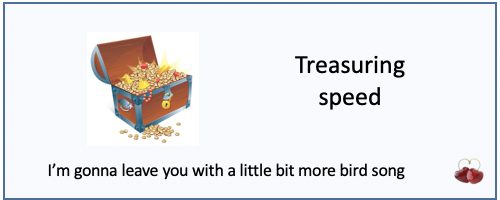54 – Treasuring speed
In my work I jump for joy when I find examples of fast speech, because these are locations in recordings that are likely to prove difficult for learners to decode: soundshapes of words are very likely to have been streamlined – and, if so, are likely to have become unfamiliar and/or difficult to catch. An example of such fast speech I have recently come across is provided by Julian Treasure in a TED talk he gave in July 2009.
One of his closing sentences went: I’m going to leave you with with a little bit more birdsong. But interestingly, the TED transcript gives fewer words than this: I’ll leave you with more birdsong. (Omitting words/fillers which don’t contribute hugely to meaning is quite common in such transcripts.)
TED 660 JULIAN Treasure The 4 ways sound affects us 21 July 2009
The length of this talk is 5 minutes 26 seconds, with an average speed of 207.42 words per minute (as measured by the TED Corpus Search Engine here).
Speed of the sentence
I measure the duration of Julian’s I’m going to leave you with with a little bit more birdsong at 1.7 seconds. If we take a Garden approach to counting words (counting standard contractions – I’m and gonna – as single words, and I’m gonna as three syllables) then
- there are 10 words
- the speed is 5.9 words per second,
- which comes to 354 words per minute – 75% faster than the average speed of 207
- there are 13 syllables
- the speed is 7.7 syllables per second
- which comes to 460 syllables per minute
So this whole sentence itself is much faster than the talk as a whole. At this point I would like to compare the speed-in-syllables of this sentence with the speed-in-syllables of the recording as a whole, but I don’t have this available to me. However what we can do is compare it to the notions of ‘fastest’ speech in the research literature. A commonly accepted measure in the research literature of the ‘fastest’ speed for spontaneous speech is 5.4 sps (Field, 2019:63; Laver, 1994:541). This is 30% lower than Julian Treasure’s sentence.
But if we focus on the verb group (I’m gonna leave you) and the word cluster (with a little bit more) we find that these go at 9.0 syllables per second – whereas ‘bird song’ goes at 4.3 syllables per second. So the average speeds, usually minute-averages (words or syllables per 60 seconds), can hide a wide variation in speeds around the average – from off-the-scale fast (9.0+), to slow and stately.
For me, it is on these very short stretches of speech that decoding work needs to focus. Precisely because they present such a speedy challenge to learners.



Leave a Reply